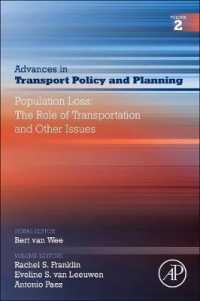- ホーム
- > 洋書
- > 英文書
- > Politics / International Relations
Full Description
In an era of globalization, international communication constantly takes place across borders, defying sovereign control as it influences opinion. While diplomacy between states is the visible face of international relations, this "informal diplomacy" is usually less visible but no less powerful. Information politics can be found in propaganda, Internet politics, educational exchanges, tourism, and even popular film.
The International Politics of Communication examines this informational dimension of international politics, investigating how information is generated, conveyed through channels, and directed specifically at audiences. While citizens are often portrayed as faithfully loyal supporters and beneficiaries of the modern nation-state—a fiction supported by passports, identification papers, and other notarized credentials—they are subject to the pulls of loyalty from transnational tribal affiliations, mythological and historical narratives of ethnicity, as well as the transcendental claims of religion and philosophy. Increasingly, social media also enchants non-state individuals, providing new virtual communities as the center of loyalties rather than national affiliations. By reinterpreting taken-for-granted concepts in journalism, media, political economy, nationalism, development, and propaganda as information politics, this book prepares serious-minded scholars, citizens, politicians, and social activists everywhere to understand the power plays in international communication and use alternatives to begin transforming power relations.
Contents
List of Figures and Table
List of Abbreviations
Acknowledgments
Chapter 1- International Communication as Political
Chapter 2- The Power of Sources: Governments and Journalists
Chapter 3- Channel Power: Media Form, Political Implications
Chapter 4- Audience Power
Section 2: On Community in International Communication
Chapter 5- Community I: Nations, Civilizations & Ideology in Intercultural Communication
Chapter 6- Community II: Development and Communications
Chapter 7- Community III: Transparency and Good Governance
Section 3: On Socialization in International Communication
Chapter 8- Socialization I: Diplomacy and Propaganda
Chapter 9- Socialization II: Non-State Actors and Transnational Internet Politics
Chapter 10- Socialization III: Peace Education and Tourism
Chapter 11- Socialization IV: Politics of the Globalization of Popular Culture in Film
Chapter 12- Conclusion: The International Politics of Communication between National Security and Cosmopolitan Community
Bibliography
Index








